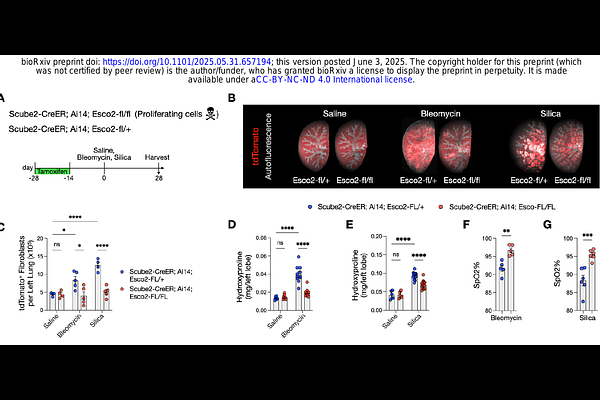Clonal Expansion of Alveolar Fibroblast Progeny Drives Pulmonary Fibrosis

Clonal Expansion of Alveolar Fibroblast Progeny Drives Pulmonary Fibrosis
Molina, C.; Tsukui, T.; Khan, I.; Ren, X.; Qiu, W.; Matthay, M.; Wolters, P.; Sheppard, D.
AbstractPulmonary fibrosis has been called a fibroproliferative disease but the functional importance of proliferating fibroblasts to pulmonary fibrosis has not been systematically examined. In response to alveolar injury, resting alveolar fibroblasts differentiate into fibrotic fibroblasts that express high levels of collagens. However, what role, if any, proliferation plays in the accumulation of fibrotic fibroblasts remains unclear. Through EdU incorporation, genetic lineage tracing, and single cell RNA sequencing, we resolve the proliferation dynamics of lung fibroblasts during post-injury fibrogenesis. Our data show substantial DNA replication in progeny of alveolar fibroblasts in two models of pulmonary fibrosis. By genetically labeling individual cells, we observe clonal expansion of alveolar fibroblast descendants principally in regions of fibrotic remodeling. The transcriptome of proliferating fibroblasts closely resembles that of fibrotic fibroblasts, suggesting that fibroblasts can first differentiate into fibrotic fibroblasts and then proliferate. Genetic ablation of proliferating fibroblasts and selective inhibition of cytokinesis in alveolar fibroblast descendants significantly mitigates pulmonary fibrosis and rescues lung function. Furthermore, fibroblasts in precision-cut lung slices from human fibrotic lungs exhibit higher proliferation rates than those in non-diseased lungs. This work establishes fibroblast proliferation as a critical driver of pulmonary fibrosis and suggests that specifically targeting fibroblast proliferation could be a new therapeutic strategy for fibrotic diseases.